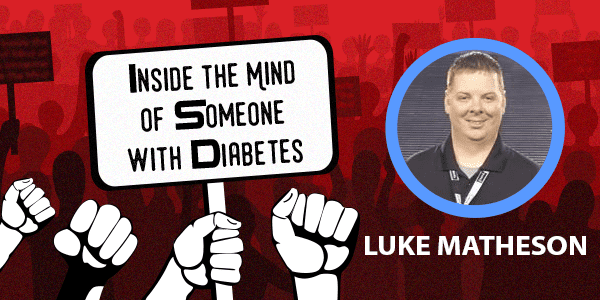
Today I'm interviewing Luke Matheson, who is living a successful, healthy life with Type 1 Diabetes. As a member of the United States Army, Luke discovered he had Type 1, and began a new life and journey from there.
First off, what type of diabetes do you have? We have readers with all types, so it's important to talk about this first.
I am a Type One diabetic.
How were you made aware that you had diabetes? Please share your diagnosis story with our readers.
I was in the US Army and I began to lose a lot of weight, couldn't get enough to drink, had bad leg cramps at night, etc. The Army tried telling me I was dehydrated, so I would drink more water and Gatorade. I eventually passed out and ended up in a hospital. Still, they said I was dehydrated. They gave me an I.V. and I didn't make it ¼ of the way through the first bag and needed to use the rest room. They told me that was impossible due to how dehydrated I was, but they would let me try. I urinated crystal clear and they knew it was something else then. They ran my blood sugar and it was 763. I was officially diagnosed at that time.
We're all curious, even if we live the life, everyone is different, what is a typical day like for you?
I am a sports writer by trade now, so I work from home, but do go on the road at times. I have my struggles like everyone else, but I typically test before each meal, two hours afterwards, and take shots up to eight times per day.
Describe the one scariest moment since your diagnosis.
I bottomed out at 30 one night, and struggled to get it to come back up. I ate cookies, candy bars, drank a juice box, etc., and it just wouldn't come up. I finally got it to get right about an hour later and was okay, but it scared me because it was taking so long.
Living with a chronic illness can be overwhelming, how do you cope with the constant battle of trying to maintain a proper balance with your blood sugars?
It is very easy to get frustrated, but you just have to keep fighting. For me, I look at my kids and know I want to be around to see them grow up.
If you could give one tip to someone newly diagnosed what would it be?
Listen to your doctors and do things the right way.
What is the most challenging aspect to you, in living with diabetes?
I would suppose it is the same challenge for many diabetics; dealing with people who know nothing about the disease, but they want to try to tell you how to live your life because their dog's sister's aunt's nephew had it.
What was your reaction when you found out you had diabetes?
I wasn't surprised. It runs in my family, so after the initial "wow, I have it now too" thought, I wasn't that shocked.
What was hardest for you and your family — emotionally? Or financially?
For me it was financially. I was in the Army as mentioned above, and was given a medical discharge. You can't be Type One and serve in the military. I came home to one final paycheck from the Army, and struggled to find work once I returned home.
How often do you have to test your glucose levels?
I test my blood sugar every two hours once I wake up.
What insulins have you used or do you currently use?
I use Lantus and Novolog.
What would you like people who have diabetes to know?
Just keep fighting, and don't give up. We all have our good and bad days, but you just have to keep fighting.
Who do you get support from? Who treats you?
My wife is amazing, and I have a wonderful group of doctors at the V.A. Hospital in Little Rock and North Little Rock, Arkansas.
Let's conclude on a positive note. I know it can be difficult to find the light at the end of the tunnel, but if you thought really hard, what is one positive thing that diabetes has brought to your life?
It has shown me that I can overcome adversity. I can look this disease right in the eye and know I can control it, and it doesn't control me.
TheDiabetesCouncil Article | Reviewed by Dr. Sergii Vasyliuk MD on May 30, 2020

